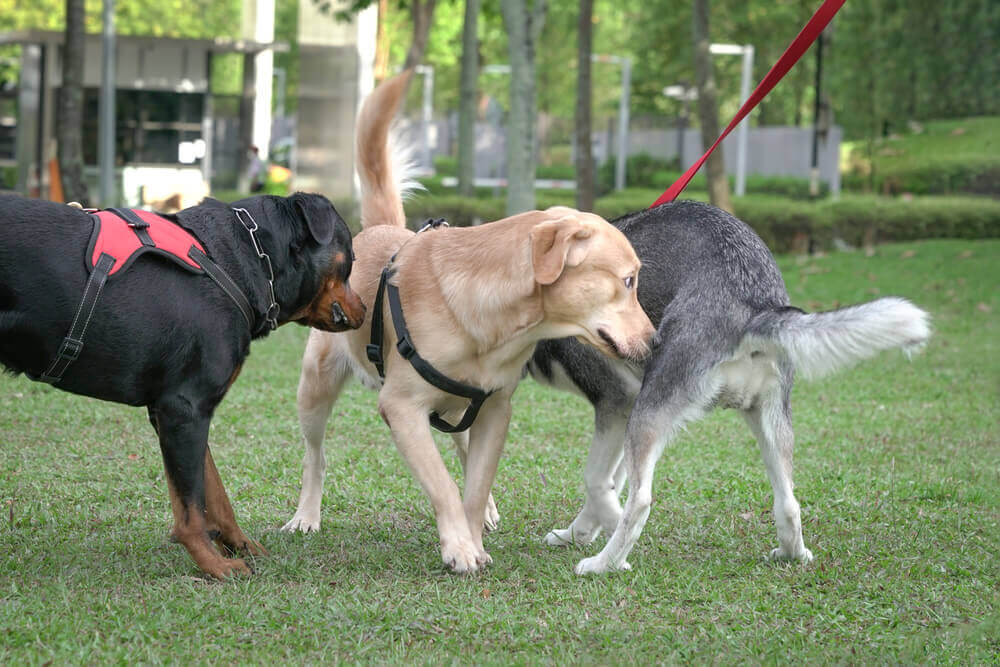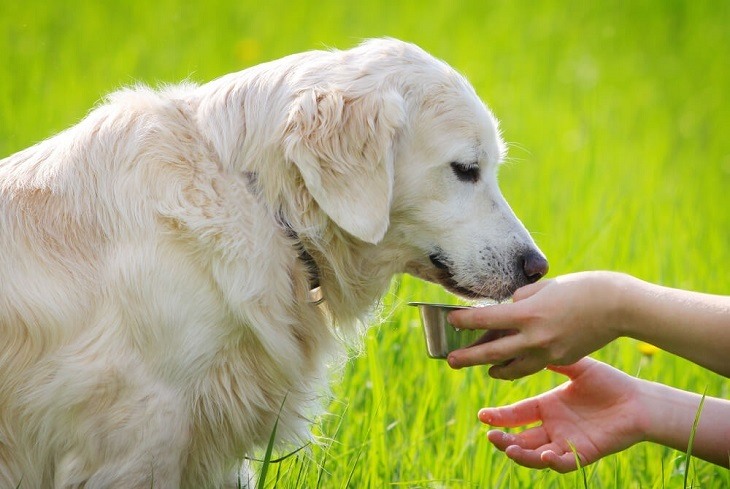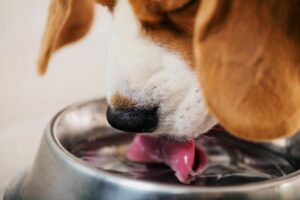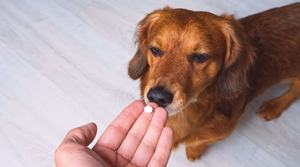Very few dogs don't smell of anything. Most have what pet parents term 'a doggy smell' and a wet dog certainly has a very distinct odor.
Other odors may depend on what your pup has been up to - you'll usually know if he's been rolling in something he should not have - but what if your dog smells like fish, and nothing even vaguely fishy has been on his dinner menu recently?
If that happens, it would be a natural reaction to immediately wonder, "why does my dog smell like fish?"
A fishy smelling dog is not as unusual as you might think, and the smell can be a sign of a number of different underlying health conditions, some more serious than others.
To help you determine why your dog smells like fish, and what you should do about it, we're going to take a closer look at this pungent problem now.
Where Is That Fishy Smell Coming From?
Before looking into some of the health conditions that can cause a dog to have a strange, fish-like odor, you'll need to attempt to figure out where it's coming from. Is it from your dog's lips, ears, beneath the tail, around the buttocks, or just in general?
There are various reasons why your dog may smell strangely fishy, and determining where the odor is most noticeable will help you solve the riddle. This will involve sniffing him, which he may find a little strange, but it is the best way to find out for sure.
Some of the health issues that may be causing a fishy odor can include:
- Ear infections
- Tooth infections and dental disease
- Dandruff or other skin and coat conditions (likely if the smell seems to emanate from their whole body)
- Ticks and other parasites (some insects secrete liquids that have a fishy smell)
- Liver problems.
- Yeast infections of the skin or vaginal area (in female dogs.)
You'll need to see your vet to rule out any of these health conditions as soon as possible.
However, very often a pet parent who notices their dog is selling a little fishy find that the odor seems to be coming from their rear end.
In female dogs this smell may be coming from their vagina rather than their butt, and is perfectly natural, although it may be more pungent if they are in heat.
In either sex, a fishy smell that is definitely rear related is frequently a sign of a problem with their anal sac glands.
What are Anal Sacs in Dogs?
Anal sacs are located, as the name suggests, on each side of your dog's anus, and these small sweat glands naturally release odorous secretions. The odor serves as a smell identifier for your dog, and the fluid is released every time he poops.
That's why dogs are so fascinated by each other's feces: sniffing it provides them with crucial biochemical information about other dogs who have been in the area recently. It also clarifies why sniffing under another dog's tail is such a common dog greeting! It's not rude, it's smart investigation 101, at least as far as a dog is concerned.

Dogs, Anal Sac Disease and Fishy Smells
If your dog is suffering from a form of anal sac disease, which is a blanket term used by vets to describe anything wrong with these sensitive glands, then these secretions often take on a decidedly fishy smell, and it is often a smell that lingers long after they have done their business.
There are several types of common anal sac disease related problems. The following are some of the most common, and likely to be indicated by that telltale fish smell.
1. Anal Sac Impactions
If the fluids in the anal sacs are not properly evacuated, a blockage, or impaction may occur. While your dog will typically expel fluid every time he poops, some of this fluid may occasionally stay in the anal sacs. If this continues, the fluid begins to harden, resulting in an impaction that will need to be addressed as soon as possible.
If this is indeed the problem, his anal sac will be hard to the touch and as this is usually quite painful, they may yelp if you do. This painful blockage of the anal glands might happen for several different reasons, including your dog being overweight, having softer stool that is not firm enough to trigger the evacuation of fluids as usual or even an anal sac abnormality you weren't previously aware of
It is important to get your dog to a vet to have the fluid blockage treated quickly, as if the condition is left untreated an anal sac infection, or even an abscess can develop, and that's a more serious health issue.
2. Anal Sac Infections and Abscesses
If fluid in a dog's anal sac has built up into a blockage, and isn't addressed promptly, usually with a small surgical procedure, then it is quite likely that an infection will develop, and this infection, just like a tooth infection, can lead to a very painful, and harder to treat, anal sac abscess.
This will typically require more extensive surgical intervention and a much longer recovery period.
3. Anal Sac Tumors
Very occasionally, that fish smell from your dog's butt is not the result of fluid build up but of an anal sac tumor instead. These are rare, and may not always be anything life-threatening if treated right away, but having your dog examined by a vet quickly and thoroughly is a must, as they can determine both exactly what's wrong and, should an anal sac tumor be present, what the best course of action is.
Other Signs of Anal Sac Disease in Dogs
A fish like smell is one of the signs that your dog has anal gland problems, but it may not be that pungent, and they may already be quite sick before you notice it.
There are other signs that your dog might have an anal sac problem you should also watch out for, including the following:
- Continual licking or biting around anus
- Scooting their butt along the floor
- Apparent difficulty pooping
- Yelping or flinching when pooping
- Anal sacs that are hard or apparently sensitive to the touch
- Blood or pus in their stool.
- Stool that has a strong fishy smell (even if you don't detect the smell on your pup themselves.)
Some dogs are more prone to anal sac problems than others. Dogs that are susceptible to these issues include:
- Smaller breed dogs like terriers or chihuahuas.
- Dogs prone to food allergies or digestive issues that cause diarrhea
- Dogs who are significantly overweight
How to Prevent Anal Sac Disease in Dogs

Most anal sac issues - those that lead to those fishy smells - can be successfully treated by your vet, and most dogs make a good recovery with prompt and proper treatment.
However, there are some things you can do that may help prevent anal sac disease in the first place:
1. Ensure Your Dog is at His Optimal Weight
It is not just to help prevent anal sac problems that you should watch your dog's weight of course. Being overweight leads to many of the same health concerns in dogs as it does in humans, including heart disease, respiratory disease, osteoarthritis and decreased life span.
What your pup's ideal weight is is something that your vet can help you determine if you are not sure, and the best way to maintain it is to ensure that they get enough exercise and eat a balanced, nutritious diet that does not include human food and too much fat and salt.
Exercise will also help keep your dog 'regular', helping to ensure that the secretions that should be expelled when he poops are not allowed to build up.
2. Make Sure Your Dog's Diet Contains Plenty of Fiber
A solid, but not too hard, stool is another key to the proper excretion of anal sac fluids. You can help ensure that your dog's stool is healthy by feeding him a diet that has plenty of fiber.
The good news is that most high-quality dog foods already include high enough fiber levels.
The maximum crude fiber concentration should be noted on the 'Guaranteed Analysis' supplied on your pets' food bag. Most vet-recommended dog foods contain about 5% crude fiber, which is usually sufficient for the average healthy dog.
3. Make Sure Your Dog Drinks Enough Water
Digestion problems of any kind can lead to anal sac problems, and failing to drink enough water can lead to impacted stool as well as anal sac gland irritation.
Final Word
There are a number of reasons why your dog may smell like fish, with one of the most common being anal sac disease.
Many of the related conditions are easily treated if caught in time, so as soon as you smell something fishy (pardon the pun) about your dog ensure that you address the problem quickly, so he can go back to being his healthy, sweeter smelling self fast!




